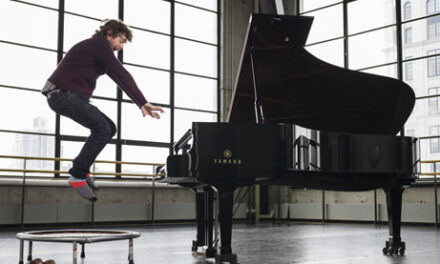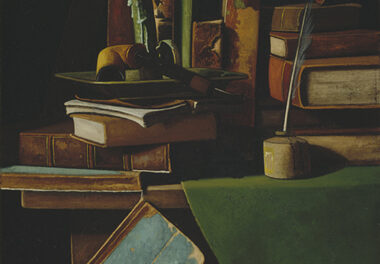Low and Lower brought lowbrow humor to Watson Hall at the University of North Carolina School of the Arts – a venue known for its high art performances. Comprised of cellist Brooks Whitehouse and bassist Paul Sharpe, “America’s #1-selling cello-bass duo” combined their mastery of classical music with their sharp wit to create an unmatched concert experience. The program began with a performance of Haydn’s Divertimento in D from the Baryton trio, arranged for cello and bass by Klaus Stoll, showcasing their ability to handle the “classics.” These highbrow pieces, however, were a mere formality, as Whitehouse prefaced the performance by saying, “What was it that Michelle Obama said? ‘If you’re gonna go low, start higher’? Something like that.”
Then fellow UNCSA faculty member, mezzo-soprano Phyllis Pancella joined Low and Lowers’ Sharpe to perform a set of songs by UNCSA student Drew Banzhoff. The set, entitled Nursery Songs, approaches the darker side of the history of these songs, not just your Mother Goose interpretations. “Three Blind Mice” referred to the execution of three Protestant bishops at the hands of Queen Mary I of England, “Bah, Bah, a Black Sheep” pointed to Medieval taxes on wool, and as for “London Bridge,” well, I will let you form your own interpretation on that one. The performers themselves described Banzhoff’s music as “bizarre” in their introduction, but the bizarreness only made the songs even more engaging and intriguing.
The duo then switched back to a more typical piece, Mozart’s Allegro from his Sonata in B-flat, KV 292, but this only served as background music to Low and Lower’s presentation of “Outhouses in Alaska: A Guided Tour,” a slideshow featuring just that: pictures of outhouses in Alaska. Inspired by the duo’s fascination with Alaska (Sharpe’s home state), these pictures contained empty outhouses, outhouses with Whitehouse and Sharpe crudely photoshopped into them, and even jokes poking fun at UNCSA faculty and slogans. It is hard to recall much about the quality of the Mozart performance itself because of how loud everyone in the hall was laughing, but I think that was the point.
The comedy, however, went even lower in the final piece, “The Three Bares,” based on the Robert Service poem of the same name. It tells the story of a woman who cleaned her pants with benzine and then threw out the extra chemicals in the outhouse, leading to an explosion after Grandpa threw a lit match in the hole. The poem ends with him wondering what he possibly could have eaten to create this catastrophe. For the final piece, the duo brought out UNCSA cello student Johanna Di Norcia, who put away her cello to perform on the “cannon” (bass drum) and the accordion she bought on eBay. The piece contains music “stolen” from Tchaikovsky’s “1812 Overture” and James Stevens’ “The Frozen Logger,” all arranged by Whitehouse. It also features bonus verses written by the mysterious Brooks Outhouse, including an entire section about the various meanings of the word “movement”…
It is interesting to note that the two “traditional” composers featured in the program also brought out their senses of humor in their own pieces (see Haydn’s “The Joke” and Mozart’s A Musical Joke) poking fun at musical forms and traditions of the time. Not to mention Mozart’s affinity for the type of humor used throughout the performance by Low and Lower. In their era, it was normal to feature humor in musical compositions to the delight of rowdy crowds. Perhaps this element of classical music in years past is something that needs to be reintroduced to the community, and Low and Lower have done a great job of starting that “movement.”













